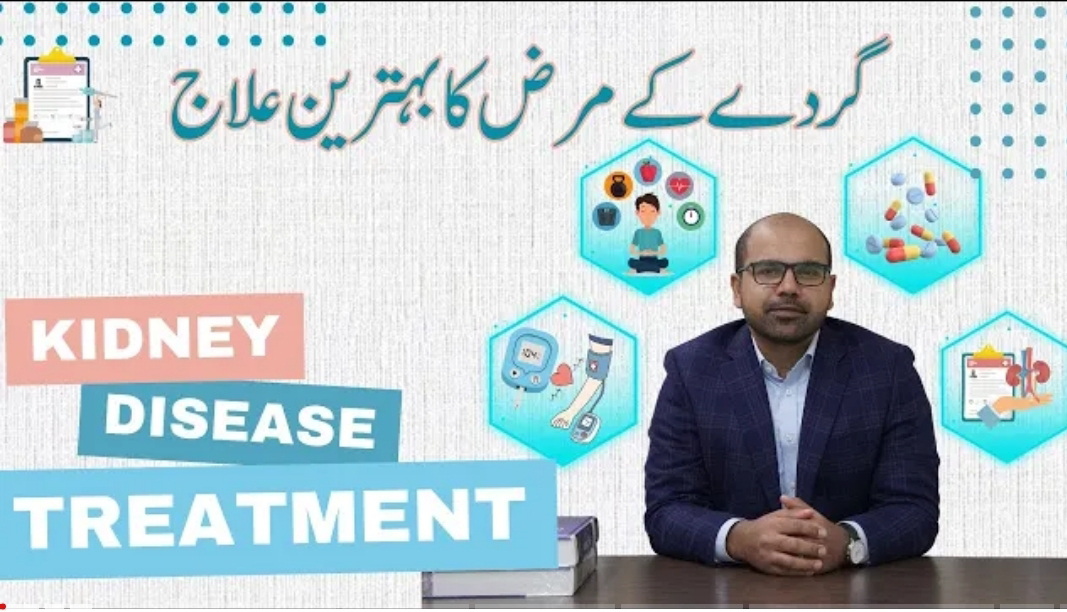How To Treat Kidney Disease: Modern Therapies Explained
In the Pakistan-India region, there is a common misconception that kidney disease has no available treatment. This belief is widespread, and today, I want to clarify that this is a significant piece of misinformation. There are indeed treatment options available to manage kidney disease effectively.
Assalamualaikum! I'm Dr. Owais Aqsa from Expert Clinic Lahore, speaking from my studio where I get the opportunity to share critical information about kidney disease with you. From speaking to patients in the clinic, engaging with people on the street, and reading comments on my YouTube channel, I’ve noticed a recurring theme: Many people believe there is no treatment available for kidney disease. This is a misconception that needs to be addressed.
Clarifying the Concept of Treatment
Before we dive deeper into this discussion, it’s essential to clarify what we mean by "treatment." If by treatment, you’re referring to a cure—a term often used by non-certified healers or traditional practitioners, implying that a disease can be eradicated entirely—then yes, it's true that there is no cure for kidney disease in that sense. However, this idea of curing chronic conditions is itself flawed. Chronic diseases like hypertension, diabetes, heart problems, and metabolic syndrome, once they progress to a certain stage, cannot be completely reversed.
For instance, if you develop diabetes due to metabolic syndrome or insulin resistance, leading to high blood pressure or structural changes in the heart or kidneys, those structural changes are irreversible, or at best, can only be improved to a limited extent. While lifestyle improvements can significantly enhance insulin sensitivity and manage the metabolic syndrome, chronic conditions like high blood pressure, diabetes, and kidney disease cannot be completely reversed once they have advanced.
The Reality of Chronic Kidney Disease
Chronic kidney disease (CKD) is one such condition that cannot be eradicated completely. Due to its chronic nature, the damage caused to the kidneys, particularly structural changes like fibrosis, cannot be reversed. Modern science, as of now, does not offer a cure for reversing these structural changes. Therefore, if you’re expecting kidney treatment to be akin to curing an infection like pneumonia or a urinary tract infection, where the disease is entirely eradicated, then such treatment options for kidney disease do not exist yet.
What Causes Kidney Disease?
To understand the treatment options available for kidney disease, it's important first to understand how kidney disease develops. I have explained in previous videos that the human kidneys contain approximately 2 million nephrons, the filtering units. When these nephrons get damaged, fibrosis begins—a process where scar tissue starts to spread in three dimensions, encompassing the entire kidney and impairing its function.
As fibrosis progresses, the remaining healthy nephrons are burdened with more work, which accelerates further damage. This cycle leads to the worsening of kidney function over time. Unfortunately, we currently do not have any medications that can halt this fibrosis process entirely. This is why no modern scientific doctor will claim to reverse kidney disease.
Management, Not Cure: A Practical Approach to Kidney Disease
Understanding that kidney disease cannot be reversed is the first step in learning how to manage it. The more practical and useful term here is "management of kidney disease." Just as you would manage other chronic conditions like high blood pressure, diabetes, or heart disease, managing kidney disease is about slowing its progression and maintaining the best possible kidney function for as long as possible.
Slowing Down the Progression: You might wonder, "How much can we slow down kidney disease?" In a healthy individual with no kidney disease, the Glomerular Filtration Rate (GFR), which measures how well the kidneys filter blood, declines by approximately 1 milliliter per minute per year. However, in someone diagnosed with CKD, where fibrosis has started, the GFR may decrease faster—ideally around 2 milliliters per minute per year.
If kidney disease is well-managed, the progression rate should ideally be less than 2 milliliters per minute per year. This reduction in progression is the goal of any nephrologist or kidney specialist. To achieve this, several management strategies are recommended.
Step 1: Addressing Co-morbidities
The first step in managing kidney disease involves addressing the co-morbidities—the underlying causes of the disease. It is crucial to ask your nephrologist, "Why did I develop kidney disease?" Once the cause is identified, the next step is to either remove or manage that cause.
For instance, if kidney disease resulted from taking certain painkillers, drinking contaminated water, or exposure to toxins, these factors must be eliminated from your life. If the cause is diabetes, hypertension, heart disease, an enlarged prostate, or recurrent kidney stones, these conditions must be carefully managed.
Controlling Blood Pressure: Aggressively managing blood pressure is essential. Although complete reversal of high blood pressure is possible with a highly disciplined lifestyle, the primary goal is to maintain blood pressure within a target range to prevent further kidney damage.
Managing Diabetes: Similarly, blood sugar levels should be well-controlled to prevent further damage to the kidneys.
Stabilizing Heart and Liver Conditions: Any heart or liver diseases must also be stabilized to minimize their impact on kidney health. Addressing these co-morbidities is the first and most crucial step in slowing down the progression of kidney disease.
Step 2: Lifestyle Changes
Lifestyle changes are vital not only for managing co-morbidities but also for directly improving kidney health. These changes support the remaining healthy nephrons and help slow the progression of kidney disease.
Regular Exercise: Engaging in regular physical activity, such as exercising for at least 30 to 45 minutes daily, is crucial.
Adequate Sleep: Ensure you get 6 to 9 hours of sleep each night. Sleep plays a critical role in healing the body and reducing inflammation, which is essential for kidney health.
Healthy Diet: Pay close attention to your diet. While I won't go into the specifics here, it’s essential to focus on consuming healthy, balanced meals.
Emotional and Mental Health: Managing stress effectively is another important aspect of maintaining kidney health. Emotional well-being directly affects your physical health.
Social Health: Lastly, maintaining a good work-life balance and dedicating time to your family and social life is crucial. Humans are social creatures, and neglecting this aspect of life can negatively impact your overall health, including kidney health.
Step 3: Medications
The third and most critical component of managing kidney disease involves medication. Currently, three major classes of medications can significantly alter the course of kidney disease:
Angiotensin-Converting Enzyme (ACE) Inhibitors and Angiotensin II Receptor Blockers (ARBs): These have been available for the past few decades and have been effectively used to manage kidney disease by controlling blood pressure and reducing proteinuria (excess protein in the urine).
SGLT2 Inhibitors: A new class of drugs, known as SGLT2 inhibitors, has emerged in the past 5-7 years, offering a groundbreaking approach to managing kidney disease. Drugs like empagliflozin and dapagliflozin have shown promising results in slowing the progression of kidney disease, particularly in patients with diabetes.
Mineralocorticoid Receptor Antagonists (MRAs): Most recently, in the past 1-2 years, another class of drugs has been introduced—MRAs—that offer additional benefits in managing kidney disease, particularly in those with heart failure.
Conclusion
Managing kidney disease is a multi-faceted approach that requires a clear understanding of the disease's nature, lifestyle adjustments, and appropriate use of medications. While a complete cure may not be possible, with the right management, the progression of kidney disease can be significantly slowed, allowing patients to maintain better kidney function and overall health for a longer period.
Remember, the key to managing kidney disease lies in addressing the underlying causes, making necessary lifestyle changes, and adhering to the prescribed medication regimen. By doing so, we can better manage this chronic condition and improve the quality of life for those affected.




Comments
Post a Comment